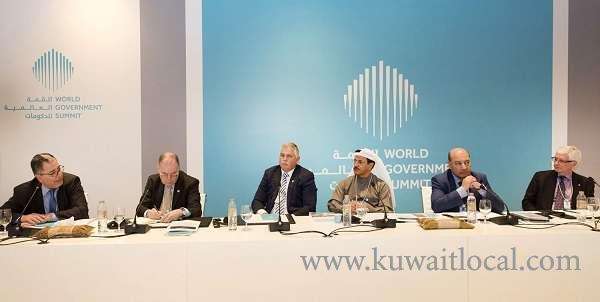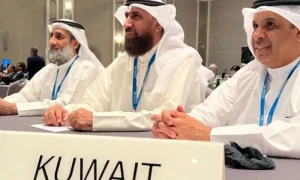Latest News
- Court Sentences Bank Employee To 5 Years For Embezzling 100,000...
- Fake ‘Sheikh’ Sentenced To 2-yr As Court Overturns Verdict
- Justice Ministry New Service On The Sahel App
- Ministry Probes 68 Cases Of Illegal Charity, Funds Collection
- Globally, Kuwait Is Among The Top Consumers Of Incense And Oud O...
- Decrease Seen In Foreign Investment
- Kuwait Customs Seized 2 Containers Laden With Tobacco At Shuwaik...
- Unpaid Salaries, Accountant Beaten Up By Workers
- The Sahel App Was Not Hacked, A Spokesman Claims
- Four Expats Arrested For Stealing Copper Cables Worth 60,000 Din...
- Indian National Died In Abdalli Car Accident
- Work Permits And Foreign Worker Transfers Are Amended By PAM
Private Sector Growth In The Middle East And North Africa Region Deprives

Rampant corruption, political instability, poor access to finance, widening skills gaps, excessive red tape, and unreliable electricity supplies are among the major factors identified by a recent survey on what continues to stunt private sector growth in the Middle East and North Africa (MENA) region.
The results of the survey, conducted by the European Bank for Reconstruction and Development (EBRD) in association with the World Bank, were revealed by the President of EBRD, Sir Suma Chakrabarti, while speaking at the World Government Summit that recently concluded in Dubai.
Stressing that the formal private sector is MENA’s main engine for growth and job creation, the EBRD president said, “Our findings are daunting, but I’m optimistic about the chances of dismantling them bit by bit,” he said. “I base that optimism on the readiness on which national governments and entrepreneurs are moving to remedy these problems themselves.”
The obstacles hampering private sector growth in the MENA region were revealed following the extensive survey which drew responses from over 6,000 businesses in countries across MENA, including from firms in Djibouti, Egypt, Jordan, Lebanon, Morocco, Palestine, Tunisia and Yemen.
The annual World Government Summit in Dubai, which this year took place from 12 to 14 February, saw global business leaders, decision makers, policy-formulators and strategists, as well thinkers and influencers from around the world, come together to present their views and help chalk out ways of shaping future governments worldwide.
Every year, at its annual confab, the summit sets the agenda for the next generation of governments with a focus on harnessing innovation and technology to solve universal challenges facing humanity. As a knowledge-exchange platform the summit is on par with other such gatherings worldwide and covers a wide variety of topics ranging from governments, futurism, technology and innovation.
The summit this year, saw experts and leaders in human development analyze trends, issues and opportunities that humanity is likely to face in the coming decades,
Speaking at the summit, Reid Hoffman, Founder and Executive Chairman of social network LinkedIn said that governments must help create the right networks for entrepreneurs to thrive. The most important ingredients for building an entrepreneurial culture include allowing people to connect with others, take intelligent risks and not be afraid of failure, said Hoffman. Helping businesses in scaling up is just as important as helping them off the ground, he said.
To a question about how governments can assist entrepreneurs in setting up businesses, Mr. Hoffman pointed to the success of Silicon Valley in the US. “Many smart engineers gather in a lot of places around the world, but what they need to succeed and to ultimately build businesses of scale are the right networks and connections, as well as access to venture capitalists who recognize and understand intelligent risk taking.”
“My personal mission is helping humanity to scale. How can we help individuals transform their economic lives? By connecting them with the right people, opportunities and resources to advance, I believe we can empower all individuals to forge better paths for themselves,” added Mr. Hoffman.
Adding to this sentiment, and elaborating on how technology is reshaping the world and the incredible, astounding level of connectivity we have today, Parag Khanna, Managing Partner, Hybrid Reality and Senior Fellow at Lee Kuan Yew School said: “What we’re finding more and more is that the voice of the people in cities, their professional businesses and social interests are setting the national agenda. The psychology of cities around the world is showing us that they favor and intrinsically depend on connectivity between them.”
Stating that there are more expatriates and more people living outside of their country of origin than ever before, he said the majority of migration in the world is across emerging and developing markets. “In the last one year alone, two billion people, represented by their governments have said they want to bring down walls, have more ease of mobility for workers, for students and for travelers, not to put up walls and barriers and restrictions. So, while it is happening in some places and walls are being built, policies around immigration are changing and in many parts of the world things are opening-up more,” he observed.
“We’re standing here in Dubai, in the United Arab Emirates, what country in the world, and what city has benefitted more from this mobility of labor? This is in fact one of the fastest growing cities ever and its infrastructural connectivity and openness to the mobility of people has been a crucial factor in the success of why we are standing here today,” said Mr. Khanna.
Trending News
-
 Eid Al Fitr 2024: Crescent Moon Not Sighted In Sau...
08 April 2024
Eid Al Fitr 2024: Crescent Moon Not Sighted In Sau...
08 April 2024 -
 Kuwait Implements Home Biometrics Services Ahead O...
14 April 2024
Kuwait Implements Home Biometrics Services Ahead O...
14 April 2024 -
 When Will Eid Al Fitr 2024 Take Place In Qatar, Ba...
08 April 2024
When Will Eid Al Fitr 2024 Take Place In Qatar, Ba...
08 April 2024 -
 On Sunday, The Meteorological Department Warns Of...
07 April 2024
On Sunday, The Meteorological Department Warns Of...
07 April 2024 -
 Kuwait Airways Provides Update On Flight Schedule...
14 April 2024
Kuwait Airways Provides Update On Flight Schedule...
14 April 2024 -
 Kuwait Airways Introduces Convenient Home Luggage...
15 April 2024
Kuwait Airways Introduces Convenient Home Luggage...
15 April 2024 -
 Gathering For Eid Al-Fitr Prayers: Kuwaiti Citizen...
10 April 2024
Gathering For Eid Al-Fitr Prayers: Kuwaiti Citizen...
10 April 2024 -
 Winners Of Kuwait National Assembly 2024 Elections
06 April 2024
Winners Of Kuwait National Assembly 2024 Elections
06 April 2024 -
 An Egyptian Expat Dies At Kuwait's Airport
11 April 2024
An Egyptian Expat Dies At Kuwait's Airport
11 April 2024 -
 Bay Zero Water Park Kuwait: Summer Season Opens Ei...
11 April 2024
Bay Zero Water Park Kuwait: Summer Season Opens Ei...
11 April 2024












Comments Post Comment